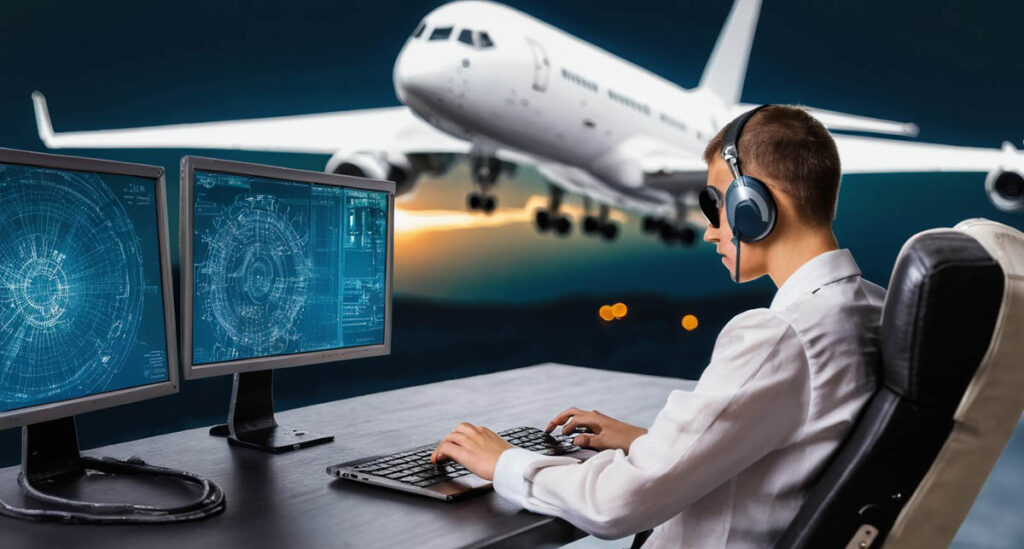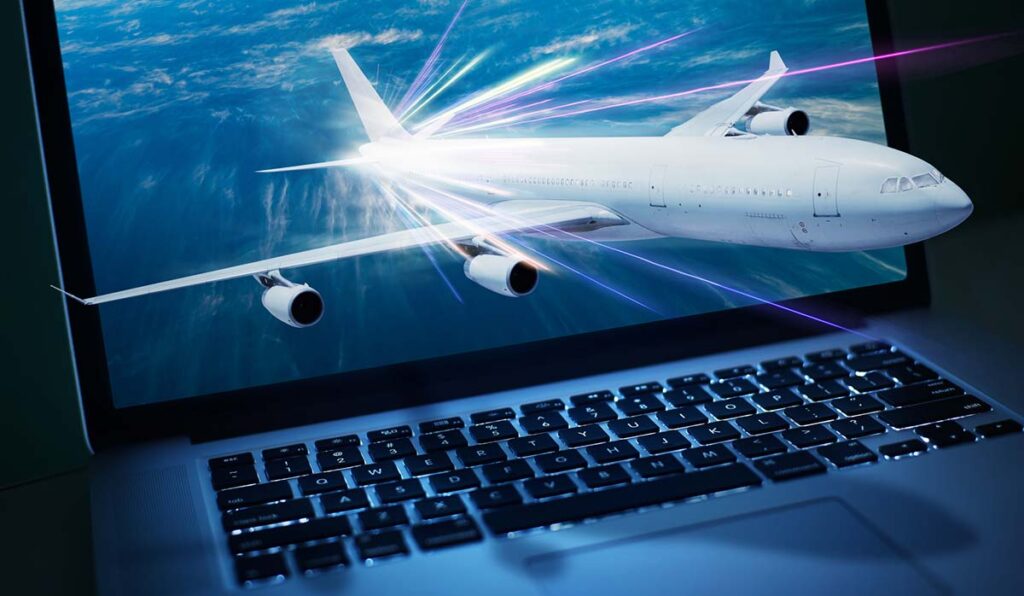The aviation industry is highly vulnerable to cyberattacks. Airports, airlines, even airplanes, and their associated subcontractors handle vast amounts of personal data. The growing digitalization of airplanes, especially in their navigation and communication systems, has opened up new vulnerabilities for cybercriminals.
Consequently, there has been a significant increase in cyberattacks in the aviation sector. In this comprehensive blog post, we talk about the threats that aerospace companies are facing and what technological advancements can make their aviation systems secure.
We will explore some best practices designed to protect both passengers and organizations from the ever-evolving array of cyber threats. That said, we’ll see how airlines and other aerospace organizations can leverage B2B cybersecurity services to enhance their service portfolio.
Top 8 Aerospace Cybersecurity Challenges
System Vulnerabilities
The aviation industry is quite vulnerable to cyber threats. There may appear flaws in aircraft and airport systems i.e. navigation, communication, air traffic control systems, etc.
Data Breaches
Airlines and airports store vast amounts of sensitive passenger data i.e. personal and financial information. This data is a prime target for cybercriminals. Such data breaches can have serious privacy implications.
Ransomware Threats
The aviation sector is susceptible to ransomware attacks. Hackers can encrypt critical systems and even disrupt operations. They can even demand hefty ransom payments to restore access.
Insider Risks
There is a concern regarding insider threats in the aviation industry. They can be either through malicious actions or unintentional mistakes, and may seriously compromise cybersecurity.
Supply Chain Vulnerabilities
The aviation supply chain is complex. It involves numerous vendors and third-party service providers. A breach in any part of this chain can have serious cybersecurity implications.
IoT Security
There’s a growing increase in the adoption of Internet of Things (IoT) devices in aviation. From passenger services to aircraft maintenance, IOT is everywhere and is introducing new potential attack vectors.
Regulatory Compliance Issues
The aviation industry needs to navigate a complex web of cybersecurity regulations and standards. It’s crucial to maintain compliance and security. At a time when sophisticated cyber threats keep surfacing and evolving, they also need to counter advanced techniques to avoid evolving security flaws.
Dependency on Third-Party Software
The aviation industry’s reliance on third-party software for various operational functions exposes vulnerabilities. Especially, if these systems are not regularly updated, the vulnerability is definitely there.

Cybersecurity in Aerospace
- The global aviation cyber security market is projected to grow from $4.91 billion in 2023 to $6.46 billion in 2027.
- Ben Gurion Airport reported blocking three million bot attempts daily to breach their systems.
- Albany International Airport experienced a ransomware attack. Criminals demanded a five-figure sum in Bitcoin.
- Air New Zealand suffered a phishing attack that compromised the personal data of over 120,000 customers.
- British Airways faced a significant data breach in 2018, with the personal data of 420K plus customers and staff compromised. It led to a record-breaking fine of £20 million for inadequate security measures.
- The integration of AI and ML into aviation cybersecurity solutions is another development.
- Major players in the aviation cyber security market focus on developing new technologies and solutions.
- Example: IATA’s launch of AVSEC Insight in 2022.
Aviation Cybersecurity Regulations & Standards
Aviation Cybersecurity Strategy
The “Aviation Cybersecurity Strategy” is a comprehensive framework related to aviation security. ICAO developed it to enhance the cybersecurity resilience of the global civil aviation sector. This strategy ensures that the aviation sector remains secure from cyber threats while continuing to innovate. It has seven key pillars:
- International cooperation
- Governance
- Effective legislation and regulations
- Cybersecurity policy
- Information sharing
- Incident management and emergency planning
- Capacity building and cybersecurity culture

Cybersecurity Action Plan
The “Cybersecurity Action Plan” (CyAP) was developed to support this strategy. It’s a foundation for collaboration among ICAO and stakeholders in the aviation industry. It outlines a series of principles and actions to achieve the objectives of the Aviation Cybersecurity Strategy. The plan develops these pillars into 32 Priority Actions. The actions are then further broken down into 51 tasks.
Professional & Managed Cybersecurity Services to Improve Aerospace CyberSecurity
Risk Assessment and Compliance Testing
They conduct thorough risk assessments and compliance testing. It’s their job to ensure that all system components are secure from cyber threats. This helps identify areas that need improvement in terms of cybersecurity.
Vulnerability Testing and Penetration Testing
These firms perform comprehensive vulnerability testing using standards like NIST, OWASP, ISO, etc. They also perform penetration testing. They simulate real-world attacks to assess the security controls of your systems.
Cybersecurity Policy Development and Implementation
They assist in developing strong cybersecurity policies and practices. They develop customized policies to the specific needs of aviation organizations.
Training and Awareness Programs
Cybersecurity firms provide training and awareness programs to promote a proactive cybersecurity culture in organizations. This includes educating employees about cyber threats.
Incident Management and Reporting
In the event of a cyber incident, you can take their help and analyze the incident. They also help you gather evidence, report the matter rapidly, and preserve forensic evidence for further investigation.
Infrastructure Security Assessments
They assess IT infrastructure to identify security gaps. They also help you ensure compliance with relevant standards i.e. DFAR, NIST 800-171, etc.

Implementation of Security Solutions
This includes deploying next-generation firewalls and advanced threat protection systems. You can also leverage their expertise to manage patch management and strengthen your network security.
Third-Party Risk Assessments
Third-party software is nearly unavoidable for your aviation operations. Cybersecurity professionals evaluate external vendors that could impact your organization’s cybersecurity posture. Ultimately, they ensure that all components of the supply chain are secure.
Development of Zero-Trust Networks
These firms help develop zero-trust networks to ensure secure connections between critical infrastructure components. They also help limit access to authorized users only.
Compliance with Regulations
Cybersecurity firms also assist aviation companies in complying with various cybersecurity regulations like GDPR, ISO 27001, PCI DSS, etc.
Rebrand Our Cybersecurity Services for Aerospace Industry: A B2B Partnership with WME
In our partnership model, we provide cybersecurity services in bulk to clients in the aerospace industry. This collaborative approach enables our clients, with their expertise in aerospace, to seamlessly integrate our cybersecurity solutions into their service offerings.
You can repackage and present these cybersecurity solutions as your own. This collaboration empowers you to enhance your service portfolios and address the unique cybersecurity needs within the aerospace sector.
Our partnership is grounded in transparency, clear legal agreements, and a commitment to quality. This collaborative model is designed to be a practical and mutually beneficial business arrangement. Our goal is to contribute to the cybersecurity strength of the aerospace industry while fostering successful partnerships based on innovation and evolution.

Use Cases: How An Aerospace Organization Can Repackage WME’s Cybersecurity Solutions
Airline Reservation System Breach
An airline’s reservation system experiences a cyber breach. The breach leads to flight disruptions. The affected airline realizes they require cybersecurity services to restore operations. Once they do that, they can subsequently resell these services to other airlines as a cybersecurity package for reservation systems.
Aircraft Maintenance Data Vulnerability:
A major aircraft manufacturer discovers vulnerabilities in its maintenance data systems. After securing their own systems, they offer their cybersecurity solutions to other manufacturers as a rebranded service.
Airport Network Security:
An international airport faces a cyber-attack that compromises its network security. The airport authority may seek cybersecurity services to recover and strengthen its defenses. They can later package these services as an airport cybersecurity solution for resale to other airports.
Pilot Training Data Leak:
A pilot training academy experiences a data leak involving sensitive pilot training information. After addressing the breach, they establish a cybersecurity division that offers other training centers comprehensive cybersecurity services and training programs.
Supply Chain Cyber Risk:
An aviation parts supplier recognizes the cyber risks within its supply chain. They invest in cybersecurity services to secure their operations and expand their offering to other suppliers in the aviation industry.
Aircraft Software Vulnerability:
A commercial airline identifies vulnerabilities in its in-flight entertainment systems. They engage cybersecurity experts to patch vulnerabilities. Subsequently, they offer their cybersecurity expertise to other airlines with similar systems.
Airport Surveillance System Vulnerabilities:
A regional airport’s surveillance system exhibits vulnerabilities that could impact airport security. After resolving the issues, they collaborate with a cybersecurity provider to offer surveillance system cybersecurity packages to other airports.
Aviation Data Center Breach:
A data center that hosts aviation industry data experiences a breach. They invest in cybersecurity services to strengthen their data center and extend their services to other data centers.
Air Traffic Control Cyber Threat:
An air traffic control authority faces a persistent cyber threat to its communication systems. They engage cybersecurity specialists and subsequently offer a communication system security package to other air traffic control centers.
Cybersecurity Training Needs:
A regional airline recognizes the need to enhance its employees’ cybersecurity awareness. After implementing comprehensive training programs, they offer their training materials and services to other airlines looking to educate their workforce on cybersecurity best practices.

More Aerospace Cybersecurity Solutions That You Can Rebrand as Yours
- Incident Response and Recovery Services
- Aircraft Software Security Assessment
- Network Security Solutions
- Data Encryption Services
- Security Training and Awareness Programs
- Supply Chain Risk Management
- Vulnerability Assessment and Patch Management
- Secure Reservation System Solutions
- Air Traffic Control System Security
- Aircraft Maintenance Data Protection
- Airport Surveillance System Cybersecurity
- Cloud Security Solutions
- Security Information and Event Management (SIEM)
- Threat Intelligence and Monitoring Services
- Endpoint Security Solutions
- Secure Data Center Services
- Identity and Access Management (IAM)
- Mobile Device Security
- Cybersecurity Compliance and Audit Services
Let’s Elucidate the Whole B2B Reselling Concept with this Scenario
Secure Reservation System Solutions: ABC Airlines
Cybersecurity Service Provider: WME Cybersecurity Solutions
Partnership Overview:
ABC Airlines recognizes the critical importance of cybersecurity for their reservation system. They realize they hold vast amounts of sensitive passenger data. So, they aim to enhance the security of their reservation system. After doing so successfully, they recognize the potential to offer similar services to other airlines looking to secure their reservation systems.
Here’s how the partnership goes:
- ABC Airlines conducts an internal assessment of its reservation system’s cybersecurity needs. Then, they identify areas for improvement.
- Feeling that they have mastered the utilization of the reservation system’s security, they recognize the opportunity to resell “Secure Reservation System Solutions.”
- They engage a reputable cybersecurity service provider known for its expertise in securing reservation systems. Let’s say they partner with us, WME. ABC Airlines partners with our cybersecurity solutions.
Bulk Service Purchase:
- ABC Airlines negotiates a bulk service agreement with WME. The agreement includes comprehensive security measures including regular assessments and incident response capabilities.
- WME customizes its cybersecurity solutions to meet the specific requirements of ABC Airlines’ rebranded reservation system.
- This includes implementing encryption, access controls, continuous monitoring, and other things, all according to the aviation-related guidelines provided by ABC Airlines.
Training and Awareness:
- WME provides cybersecurity training to ABC Airlines’ reservation system staff. They help enhance their awareness and response capabilities.
Service Reselling Strategy:
- ABC Airlines develops a strategy to resell the “Secure Reservation System Solutions” as their own branded service.
- They create a dedicated division within their company. The division focuses on offering cybersecurity services to other airlines.
- ABC Airlines markets its cybersecurity services to other airlines in the industry. They highlight their partnership with WME and the dependable security of their reservation system.
- They offer customized cybersecurity packages based on the size and needs of other airlines’ reservation systems.
- These packages include regular security assessments, real-time monitoring, and incident response services.
Revenue Sharing:
- ABC Airlines and WME agree on a revenue-sharing model. They mutually decide how the profits from the cybersecurity services are distributed between them.
- ABC Airlines and WME maintain an ongoing collaboration. They ensure the effectiveness of the cybersecurity solutions.
- They periodically update the services to address emerging threats and industry changes.
This partnership allows ABC Airlines to enhance the security of its reservation system while capitalizing on its cybersecurity expertise to offer valuable services to other airlines as well. They leverage the specialization of WME’s cybersecurity solutions and create a win-win scenario for both companies.

Wrapping it Up:
It requires a proactive and multi-faceted approach to address these aviation-specific cybersecurity challenges. It entails the implementation of robust cybersecurity policies, regular security assessments, continuous employee training, and industry-wide collaboration to share threat intelligence and best practices.
The aviation world is quite dynamic and interconnected. The selection of a cybersecurity partner is a critical decision for organizations operating in such a sensitive field. This decision, alone, can significantly impact your organization’s security posture, operational resilience, business reputation, and whatnot.
Why WME’s Cybersecurity Solutions Should Be the Choice for Aviation Organizations?
Our Cybersecurity solutions for the aviation industry stand out as the ideal choice for aviation entities for several compelling reasons:
✓ Aviation industry expertise
✓ Customized bespoke cybersecurity solutions
✓ State-of-the-art tools and methodologies
✓ Well-versed in aviation cybersecurity regulations and compliance standards,
✓ Round-the-clock monitoring, and incident response in high-stress operational environments.
✓ Comprehensive training programs to enhance the cybersecurity awareness and preparedness of aviation staff.
✓ Supply chain security assessment and mitigation
✓ Proven Track Record of successful partnerships with aviation clients.
✓ We offer flexibility in service packages.
✓ Active industry collaborations with other aviation entities, sharing threat intelligence and best practices.
✓ Committed to staying ahead of emerging threats via R&D
We encourage you to choose WME’s cybersecurity solutions as your trusted partner. Your aviation organization can rest assured that it’s enlisting the expertise of a dedicated team with a proven track record of protecting critical aviation systems and operations. Our commitment to excellence and unwavering focus on aviation cybersecurity makes us the preferred choice for aviation entities. If you are looking to navigate the complex landscape of cyber threats successfully, WME is your go-to choice.






